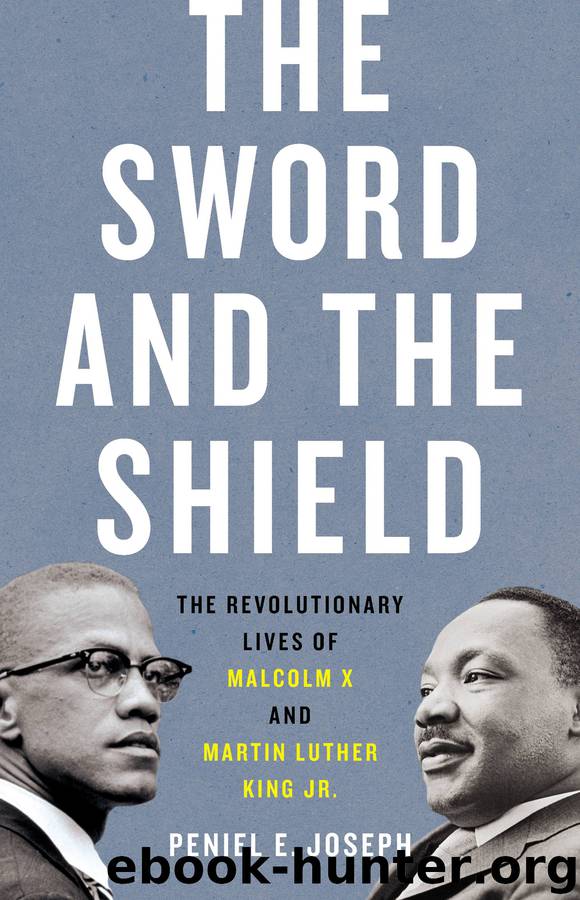The Sword and the Shield by Peniel E. Joseph

Author:Peniel E. Joseph [E. JOSEPH, PENIEL]
Language: eng
Format: epub
Publisher: Basic Books
Published: 2020-03-30T00:00:00+00:00
CHAPTER 8
“Seeking Freedom Like Dr. King, but Faster”
The occasion that drew Malcolm and Martin to the Senate proved to be a historic turning point. The civil rights bill, H.R. 7152, consisted of legislation that banned discrimination in employment and dramatically increased federal power to end racial discrimination in public life and file suits on behalf of racially integrated schools. The bill was first proposed by President Kennedy but evolved in the months after his assassination, aided through the legislative process by a coalition of liberal Democrats and Republicans in the Senate and House of Representative who bypassed a coalition of Dixiecrats and conservative Republicans, such as Arizona senator Barry Goldwater, to pass the bill on July 2. The combined might of grassroots pressure from below and skillful legislative maneuvering from the Johnson administration above aligned the political stars to achieve the most expansive measure of racial justice since Reconstruction.1
King flew to Washington to attend President Johnson’s signing of the Civil Rights Act, which passed 73 to 27 in the Senate and 289 to 126 in the House. King had come from St. Augustine, Florida, where the new law would go a long way toward ensuring a measure of racial integration but would still require enforcement. Johnson addressed a group of two hundred invited guests to the White House East Room, celebrating the victory while describing the current moment as “a time of testing.” King planned to continue what the president called “an unending search for justice within our own borders” by leading efforts to test out implementation of the new law, a situation that worried Johnson, as the presidential election was just four months away. In private, King listened to the president, but in public he went on the offensive, vowing to force compliance in recalcitrant southern cities and states. From the White House after the bill-signing ceremony, King promised “massive direct action programs” targeting parts of the South unwilling to immediately desegregate in the face of sweeping new legislation.2
One month before the passage of the civil rights bill, Malcolm X had given a surprising interview to novelist Robert Penn Warren at the Hotel Theresa, praising the goals of black dignity and respect. Compiled for a book, Who Speaks for the Negro?, published to great fanfare the next year (and also featuring an interview with King), Malcolm’s interview confounded Warren. Warren had reached for the clichéd terms—racial separatism versus integration, nonviolence versus self-defense—that dominated the mainstream civil rights discussion. Malcolm refused to be boxed in by these binaries, which failed to recognize the full range of black political reality. He eschewed his past racial separatism as impractical, even as he decried conventional notions of racial integration as a fantasy. Self-determination offered the tools for the black dignity and political power necessary to reshape American society. Malcolm suggested “nonviolence with King is only a method” but far from his main “objective.” He now recognized King as a fellow traveler on a human rights mission that conventional liberals could hardly recognize. “Well,
Download
This site does not store any files on its server. We only index and link to content provided by other sites. Please contact the content providers to delete copyright contents if any and email us, we'll remove relevant links or contents immediately.
Becoming by Michelle Obama(10020)
Beartown by Fredrik Backman(5737)
The Last Black Unicorn by Tiffany Haddish(5629)
Man's Search for Meaning by Viktor Frankl(4579)
The Book of Joy by Dalai Lama(3972)
The Five People You Meet in Heaven by Mitch Albom(3553)
In a Sunburned Country by Bill Bryson(3536)
The Choice by Edith Eva Eger(3467)
Full Circle by Michael Palin(3443)
The Mamba Mentality by Kobe Bryant(3262)
The Social Psychology of Inequality by Unknown(3017)
Imagine Me by Tahereh Mafi(2934)
Book of Life by Deborah Harkness(2930)
The Checklist Manifesto by Atul Gawande(2844)
Less by Andrew Sean Greer(2688)
A Burst of Light by Audre Lorde(2597)
The Big Twitch by Sean Dooley(2430)
No Room for Small Dreams by Shimon Peres(2362)
Everest the Cruel Way by Joe Tasker(2338)
